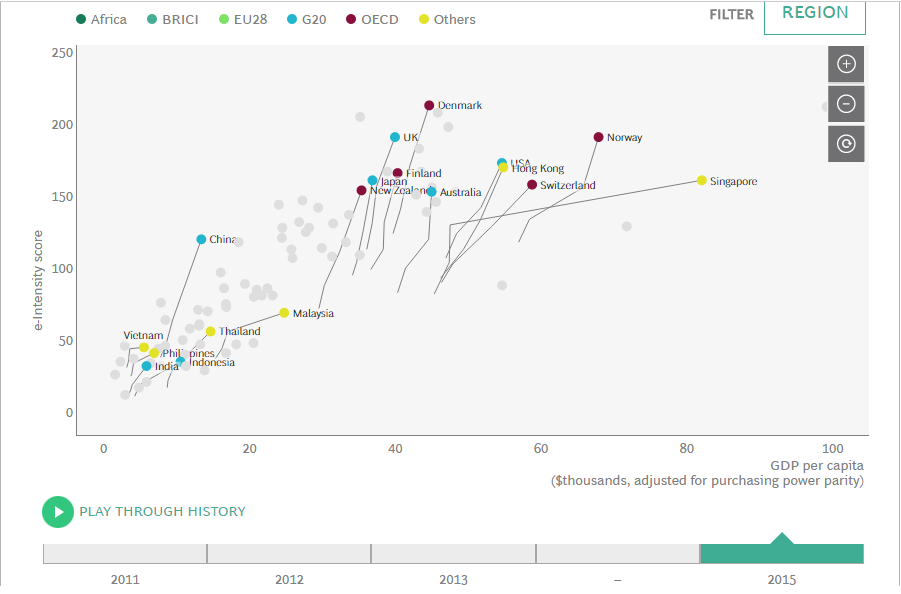Malaysia’s digital economy on a slow and steady incline: Page 3 of 3
By Anushia Kandasivam February 7, 2017
Yardsticks and the F-word
A good sign of a forward-moving ecosystem is that new and more creative ideas are constantly coming into being. This happens as there is better knowledge sharing between community and entrepreneur.
Malaysia has not reached this phase yet, as is obvious from pitching events where some of the same ideas are being thrown around as entrepreneurs still attempt to copy, adopt and adapt.
Another sure yardstick is acceptance of failure; the community’s reaction to the GrabGas failure shows just where Malaysia is in this context. Part of the drama was how the stigma of failure followed the founders around while the story was still fresh, while at the same time certain segments of the ecosystem called for better understanding and acceptance of such failures.
Ashran opines that though ‘failure’ is still often seen as a bad word, Malaysia is moving towards acceptance. Ashran himself is an entrepreneur and categorises his former businesses Joot Ventures Sdn Bhd as ‘not a pure success’, saying that he made many errors as he moved down his entrepreneurial path. “In that sense, you could say that MaGIC picked up somebody who didn’t do too well to help other players win,” he says.
“I feel that this is the view people should take when it comes to failure. Mine certainly gave me insights that are priceless.”
What is needed is an entrepreneur who bounces back after a failure and an ecosystem that supports that revival – a mutually supportive environment. Moving on from this, is the concept of acqui-hire, where a business buys out another to acquire the skills and expertise of its staff rather than for its product or market.
This is not yet common in Malaysia though it is starting to become a practice in the private sector where large, established and often traditional family-owned businesses are starting to take over and blend in up-and-coming businesses to provide a much-needed injection of innovation and new blood.
Success in the Malaysian context
Every startup ecosystem requires constant and consistent injections of ideas, support and funding not just from budding entrepreneurs, the government and investors but also from entrepreneurs who have been successful.
Malaysia cannot boast abundant unicorns and similar supersized exits but within the context of the local ecosystem there have been very successful exits. Ashran believes that the ecosystem should be striving more towards mid-sized exits as the more of these that take place, the more entrepreneurs will be inspired and willing to go down the same route and the more investors will be willing to take the investment risk. Hence, the replication process will get going.
In Malaysia, however, the layover time of successful entrepreneurs seems to be relatively short, meaning that the time they give to giving back to the ecosystem is limited. This does not, of course, apply to every entrepreneur; those who are successful on the scale of Patrick Grove, for example, move on to other projects while still contributing to the ecosystem.
To ensure that the replication process keeps going, that the ecosystem keeps growing and evolving, the government, through MaGIC, will be implementing initiatives to set up collaborations between players and get more large corporations into the mix. This will create an environment where more mid-sized exits will occur, says Ashran, thus continuing the cycle.
“In a way, we have to manage expectations. In the Malaysian context, a mid-sized exit is perfectly fine,” he points out.
Rating the ecosystem within the correct context is important. Malaysia’s certainly is not as developed as Silicon Valley, but when asked to rate the Malaysian ecosystem against its Asean competitors, Ashran puts Malaysia at a seven or eight. His justification for the high rating is two-fold: Malaysia is constantly catalysing new movements within the regional ecosystem, and its neighbours are asking it for help and support in improving their ecosystems.
All this points to a startup ecosystem – and a digital economy – that is on an upward trajectory, albeit a relatively gradual one when compared to more developed economies. It is still young, however, so continued will, focus, observation and examination is needed to ensure continued forward movement.
Related Stories:
MaGIC pushes social entrepreneurship forward through SEHATI
MaGIC’s concern over flatlining in startup ideas
MaGIC, Uber, Digi launch Asean ideation lab
MaGIC announces KL-hosted global entrepreneurial initiative … in Jakarta
For more technology news and the latest updates, follow us on Twitter, LinkedIn or Like us on Facebook.
Pages
- « first
- ‹ previous
- 1
- 2
- 3



